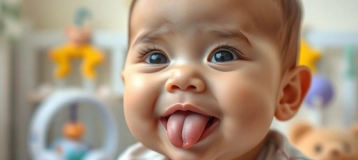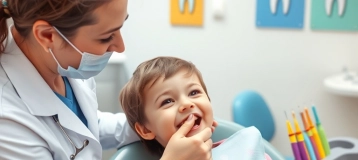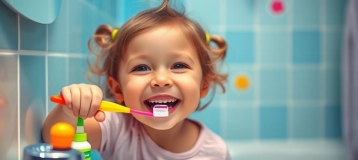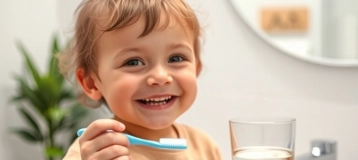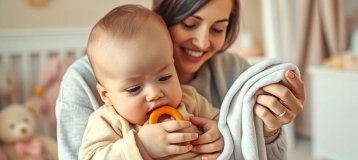It's a common belief that a baby's diarrhea is a direct result of teething, but medical experts say this isn't true. While your baby might experience irritability, drooling, and a desire to chew on everything, diarrhea is not a symptom of a new tooth pushing through. So, why do so many parents find that their baby's teeth and an upset stomach seem to arrive at the same time? The answer lies in a few common connections, and knowing what they are can help you protect your child.
The "Everything in Mouth" Connection
Babies love to explore the world with their mouths, especially when teething. To soothe their aching gums, they'll often chew on anything they can get their hands on, from toys to items on the floor. This behavior increases their exposure to germs and bacteria that can cause diarrhea.
The Solution: The best way to prevent this is to be vigilant about cleanliness. Keep your home's floors and surfaces as clean as possible. Offer your baby a few clean, soft teething rings (chilled, not frozen, to avoid gum damage) to chew on.
The Immunity Connection
Teething typically happens between 6 months and 2 years old. This is also the age when a baby's immune system is still developing, making them more vulnerable to infections and viruses. It's often a coincidence that a viral or bacterial illness causing diarrhea occurs at the same time as teething.
The Solution: You can help build your child's immune system through breastfeeding, providing nutrient-rich foods, and following their recommended vaccination schedule. Your baby's body builds antibodies with each exposure to germs, strengthening their immunity over time.
treating diarrhea
Since diarrhea isn't a teething symptom, it's important to treat it promptly. Diarrhea can be caused by changes in diet, antibiotics, or an underlying infection, and it can lead to dehydration. Here are some steps you can take:
Maintain Hydration: Continue to breastfeed or bottle-feed on a regular schedule. For older infants, offer small, frequent servings of foods that can help manage the condition, like bananas, rice, and toast. You can also offer an infant oral electrolyte solution to help with hydration.
Avoid Sugary Liquids: Stay away from juices and other sugary drinks, which can make diarrhea worse.
Prevent Diaper Rash: Change soiled diapers immediately and apply a diaper rash cream to protect your baby's skin.
When to Call the Doctor
It's always a good idea to contact your pediatrician if you're concerned. You should definitely seek medical advice if your baby experiences:
Severe diarrhea for one day.
Mild to moderate diarrhea for more than two or three days.
Vomiting along with diarrhea.
A fever over 101 degrees Fahrenheit.
Bloody diarrhea.
Comforting Your Teething Baby
Even without diarrhea, teething can be painful. You can help comfort your baby by holding them, giving them a gentle back rub, or using distractions like toys and songs. A chilled teething ring or a cold, wet washcloth can also provide relief. Over-the-counter pain medication can be used in an age-appropriate dose after consulting with your pediatrician. Remember, avoid using frozen items or alcohol to numb the gums, as these can cause harm.
While loving care won't stop diarrhea, it can soothe your baby through a difficult time. If home treatments don't work, don't hesitate to call your doctor to ensure your little one stays healthy and hydrated.
Pro Tip
The content of the article is shared by netizens, please carefully identify it
